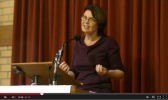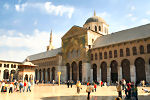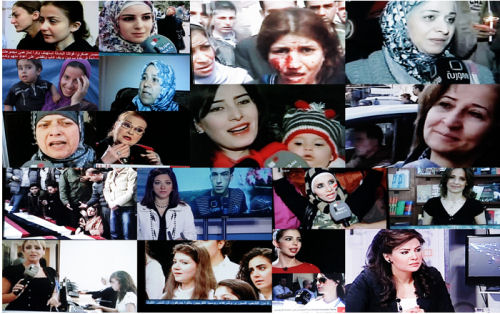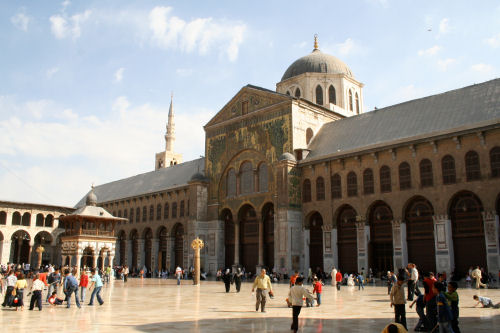Video and Transcript: Politics and war in Syria: Part One. Susan Dirgham interviews Jeremy Salt
Susan Dirgham is convener of Australians for Reconciliation in Syria (AMRIS) and Jeremy Salt is a scholar of Media propaganda and the Middle East. In Part One, they discuss the history of western interventions in the Middle East and the most recent in Syria. Then, on western mass media, Susan raises the question of why we don't hear about how Syria is a secular country, with women's rights and where women were granted the vote in 1949. Below is a mixture of description, summary and transcript. If you want to cite exactly, then you would need to listen to the video.
PART ONE:
JEREMY SALT: Talks about 19th century history of interventions in the Middle East, then about intervention in Iraq in 1990s. The UN ran this nominally, but really England and United States did. Two UN humanitarians objected to the inhumanity of economic sanctions against Iraq, possibly even mentioned ‘genocide’: they were Denis Halliday and Hans von Sponeck. [1] To Susan’s question, Dr Salt agrees that UN personnel no longer speak out.
2003 ‘weapons of mass destruction’: The use of no-fly zones to conduct aerial bombardments. [2] Libya. No fly zone fig leaf. Syria; they wanted to get a UN resolution for a no-fly zone, but Russia and China blocked this with the UN. Next best thing pull down the government of Damascus by using armed gangs – mercenaries. From 2011 until now and still have not reached their main objective, which is the destruction of the government in Damascus, but they have destroyed a large part of Syria.
Similar to the Sandinista template of mercenaries used in Nicaragua.
SUSAN DIRGHAM: Why do these people choose to fight for/align themselves with western governments when they can see as clearly as you and I can see that these western governments are out to destroy Arab societies?
JEREMY SALT: (Not exact quotes always; some paraphrase) But we don’t know who these people are. Initially some of them were Syrians, but a lot were from Iraq. Because, in many ways, the war in Syria is the Iraq war exported. The Saudis and other Gulf states have pumped money into Sunni Muslim groups in Western Iraq to destabilise the government in Bagdad, which they didn’t like.
The whole protest movement in Syria was wildly exaggerated [by external war-mongering forces] who were waiting to seize just such an opportunity to make their move against Syria. We’ve seen this happen in Latin America, the Middle East over many, many decades. It happened in Chili, Iran, Ukraine. When the people begin to protest, you come in from behind and you turn those protests to your advantage.
So, for the question of why local people would support western-aligned interventions, the level of true support is unknown. This is not a civil war. This is a campaign against Syria orchestrated by outside governments, who want to destroy Syria and are using a protest movement. Infiltrating it. You might remember the first week of that protest movement in Dada, in Southern Syria. We are told that the Syrian military started firing into peaceful protesters. What the media didn’t report was the number of civilians and police who were killed by armed men in that week. And we were told by the same media that there were snipers on rooftops firing into peaceful demonstrators. They said, ‘government snipers’. Almost certainly, they were not. They were provocateurs, stirring as much trouble up as they could. Since those days, we know full well, that the number of foreigners coming to Syria has turned into a flood.
SUSAN DIRGHAM: Jeremy, the thing you mention about snipers; I was in Damascus in April 2011, just one month after the start of the crisis, and I met a young man who had been to an anti-government rally just that morning and he said that two people were killed at the rally and others were shot. There were police at the rally with arms, but they did not draw their weapons. So it was just a mystery, who killed these people and Syrians know this.
JEREMY SALT: Once again, this is part of a template. This happens in many situations like this. Where you send your undercover agents into a situation. They open fire from a rooftop or from round a corner. No-one really knows who does it, but that’s the opportunity that the enemy wants, and its media wants, to portray the government as being brutal and oppressive – to killing its own people.
So, what we are seeing in Syria is just another repeat of what we have seen in many, many other countries. We had this in Istanbul, in . There was a Mayday march and people started firing into the crowd. They were obviously agent-provocateurs. Turning the whole demonstration – disrupting it – turning it into a panic-stricken kind of riot. Cause people didn’t know what was going on.
SUSAN DIRGHAM: One thing that people don’t know is that there was the CIA-orchestrated coup in Syria in 1949. The first CIA coup ever. The CIA had just been recently set up. This was in Syria. So Syrian people know their history, know their enemies –
JEREMY SALT: The whole thing is people in the Arab world generally have a very strong grasp of history and, you know, the people who suffer, who are the victims, remember the history. The people who do bad things to them; they want to move on, want to forget it. So, of course there is a [?known] history. And it’s not just 1949; This goes back to the end of the first world war. Syria has been ‘under siege’, effectively, all that time, up unto the present day. So, 1949, yes, that coup, Husni al-Zaim was put there by the CIA, and then he’s followed by a second man, Sami al-Hinnawi, then Adib Shishakli. And Shishakli, whether he was actually put-up to it by the Americans, is not clear. He probably wasn’t, but what he did, the Americans liked. Because, one thing that he didn’t like was a proposal to unite the fertile crescent. To bring Syria and Iraq together. Iraq was under the domination of the British, so, if that had happened, it would have held a wonderful advantage for Britain – and the Americans didn’t want that. Because, beneath all of these things that we are talking about, all through the 20th century, up to the present day, there were these subterranean tensions between these outside powers. Britain and France were wartime allies in 1914. Once the war was over, they were rivals. And the British did what they could to limit French gains. And why did the French leave Syria in 1946? Because the British put pressure on them. Made them leave, because France was, relatively speaking, in a weak position. Britain was weak, but not as weak. And we see, in the 1950s, Britain and the United States, this same sort of subterranean tension playing up because Britain’s fading as an imperial power, America’s moving into the region and doesn’t want the British to regain lost ground. So this is all part of the picture.
Secular society and women’s rights in Syria: if people knew the truth…
SUSAN DIRGHAM: Another bit of history going back to those times, is that women were given the vote in Syria in 1949. And what disturbs me greatly is we [Australians/westerners] don’t really know what Syrian society is like. It’s hidden behind that ‘brutal dictator’. So our media is presenting a ‘brutal dictator’ versus ‘rebels’ and, behind that ‘brutal dictator’, you’ve got the army - a secular army - and you’ve got a secular society, and you’ve got women, who have extraordinary freedoms. Do you think, if we knew …?
Western governments and media do not want us to know the truth
JEREMY SALT: Yes, of course, if we knew; if people went there. I mean Syria had a quite reasonable tourist industry before this war broke out. We all know that Syria’s a fantastic country. A wonderful place, right. So, a number of people who go there would see that for themselves, but what the others have to rely on is what the media tell them. And the media doesn’t tell them the things that you’re saying. And the media wasn’t saying these things about many, many other countries. The media will pick up a story, a narrative, which fits in with what they and the government wants. As it did over Iraq, as it has done with many other situations. So Syria becomes a target to be destroyed, therefore it’s not in the interests of the government or much of the media to talk about positive things about Syria. Not to talk about a secular society, freedom for women, and all the rest – because people would say then, ‘Well, why are we taking Syria? Why are we going for Syria?
And so the narrative over Syria has been shocking from the beginning. There has been no balanced reporting whatsoever about Syria. I mean, one or two reporters file reasonable reports from time to time, but 95, 97% of the coverage has not conformed in any way to the standards of proper journalism. It’s been completely biased. You haven’t seen the other side. If you are a journalist the primary responsibility is what they call ‘balance’. You’re never going to achieve perfect balance, but in a situation like this, even if you want to report what the rebels are saying and doing - even if you and I don’t think they really are rebels – let them have their say. Let people think about it. But you have to report what the others are saying. You have to go to the Syrian government. You’ve got to go to the victims of the rebels. They are very good – the media – for the last five years has talked about the ‘victims of the Syrian army’ – as they say it – but they haven’t paid any attention at all to the victims of these armed groups. And if they did, then naturally, people would get a very different idea. If they [journalists] talked to the government and were able to see what happens in families who’ve lost young men. I mean, how many young men have died in Syria fighting these [‘rebel’] groups? Sixty thousand? Something like that. Plus all the others – tens of thousands – wounded. If that were shown, the whole narrative would be disrupted. But it can’t be shown. It can’t be shown. You cannot really show the victims of war. This is common in all wars. They don’t like to show the gruesome detail.
We saw the other day how Obama was wiping away tears for children who had been shot dead in America. Well, this is the same Obama who has been ordering missile strikes in Yemen that have killed children. Now if you show the victims of those missile strikes in Yemen – actually show the bodies – well then, the American public would do a double-take: ‘What on earth are we doing? Dead children! We’re killing children in Yemen.’ No, you don’t see those photographs. And the same in Syria. You don’t see the gory detail of what the armed groups are doing. It will be played down. But when the government does something, or the military does something, it’s magnified to the ultimate degree. So there can’t be any trust in the mainstream media now, there cannot be. After the absolute pinnacle of propaganda about Iraq; Syria is even worse.
NOTES
[1] Denis Halliday - Wikipedia, the free encyclopedia https://en.wikipedia.org/wiki/Denis_Halliday. Denis J. Halliday (born c.1941) was the United Nations Humanitarian Coordinator in Iraq from 1 September 1997 until 1998. He is Irish and holds an M.A. in ...
Hans von Sponeck: Economic Sanctions "Hit Wrong Target," Says Former U.N. ...
www.wrmea.org/.../economic-sanctions-hit-wrong-target-says-former-u.n.-... Economic Sanctions “Hit Wrong Target,” Says Former U.N. Humanitarian ... Iraq,” warned former United Nations Humanitarian Coordinator Hans von Sponeck, .... Commonwealth Club of California held at the swank Westin St. Francis Hotel in ..
[2] Use of ‘No Fly Zones’: The way this works is to accuse a government of bombing its own citizens then for external powers to declare a ‘no fly zone’, which is somehow interpreted to mean that those powers can enter the zone and bomb government planes which may actually be trying to defend themselves against armed takeovers that imperil citizens. So this stops a country from defending itself militarily and enables outside powers to take over, beginning with the airspace.

 How could we allow America, NATO, Israel or other Arab states to destroy something so ancient and valuable for all humanity as Syria - the last secular Arab state? Australian peace activist, Susan Dirgham, taught English for years in Syria and got to know the country and its people very well. She argues that, without deception and our complicity through ignorance, there could be no war in Syria. But how do we work out for ourselves what is really happening in Syria and who to help? We need to understand more of Syria's history and its geopolitical position, to which she provides insight here. Just as we need to severely question the notion of US-NATO presenting a 'majority' opinion, we also need to very carefully assess what NGOs are doing in Syria. Susan is the national co-ordinator of “Australians for Mussalaha (Reconciliation) in Syria" (AMRIS). She has travelled very widely and even lived in China before it was opened to the West. When she speaks she provides testable facts and does not talk down to her audience or ask for money. Please consider asking her to speak. You may contact her at susan.dirgham51[AT[gmail.com. There is a question and answer session at the end of this video.
How could we allow America, NATO, Israel or other Arab states to destroy something so ancient and valuable for all humanity as Syria - the last secular Arab state? Australian peace activist, Susan Dirgham, taught English for years in Syria and got to know the country and its people very well. She argues that, without deception and our complicity through ignorance, there could be no war in Syria. But how do we work out for ourselves what is really happening in Syria and who to help? We need to understand more of Syria's history and its geopolitical position, to which she provides insight here. Just as we need to severely question the notion of US-NATO presenting a 'majority' opinion, we also need to very carefully assess what NGOs are doing in Syria. Susan is the national co-ordinator of “Australians for Mussalaha (Reconciliation) in Syria" (AMRIS). She has travelled very widely and even lived in China before it was opened to the West. When she speaks she provides testable facts and does not talk down to her audience or ask for money. Please consider asking her to speak. You may contact her at susan.dirgham51[AT[gmail.com. There is a question and answer session at the end of this video. Susan Dirgham describes herself as a peace activist. Her peace activism dates back to her involvement in the anti-Vietnam war movement when she became aware that lies were being told to promote the War, when even apparently well-intentioned people could believe these lies and spread them. She writes, "And at that time, in the US especially, it required informed, courageous individuals in the media, in churches and academia to challenge those lies in order for there to be peace. And in the countries of Indo-China, an extraordinary level of courage and resilience was needed to survive war. To sow sectarian hatred, to damn a person or a group of people or even another nation only takes a few stories, repeated over a period of time by people in positions of influence and then accepted as a truth." Susan identifies a formula for writing [propaganda] on the conflict in Syria. It is to invoke the use of chemical weapons by the Assad government as if this were established fact and to "Damn Assad and the Alawites and your article has a good chance of getting published even if you know virtually nothing." She gives the example of a Waleed Aly article doing just this, ironically just a week after the presidential election in Syria when there was a truly exceptional voter turnout and the president received overwhelming endorsement by Syrians. At the end of her speech, Susan warns that if Syria falls the danger of World War Three will be acute. Susan's highly informative and moving speech was delivered at a Social Policy Connections Public Forum at The Study Centre, Yarra Theological Union, on 6 November. The speech was filmed and we hope to be able to link to the film soon.
Susan Dirgham describes herself as a peace activist. Her peace activism dates back to her involvement in the anti-Vietnam war movement when she became aware that lies were being told to promote the War, when even apparently well-intentioned people could believe these lies and spread them. She writes, "And at that time, in the US especially, it required informed, courageous individuals in the media, in churches and academia to challenge those lies in order for there to be peace. And in the countries of Indo-China, an extraordinary level of courage and resilience was needed to survive war. To sow sectarian hatred, to damn a person or a group of people or even another nation only takes a few stories, repeated over a period of time by people in positions of influence and then accepted as a truth." Susan identifies a formula for writing [propaganda] on the conflict in Syria. It is to invoke the use of chemical weapons by the Assad government as if this were established fact and to "Damn Assad and the Alawites and your article has a good chance of getting published even if you know virtually nothing." She gives the example of a Waleed Aly article doing just this, ironically just a week after the presidential election in Syria when there was a truly exceptional voter turnout and the president received overwhelming endorsement by Syrians. At the end of her speech, Susan warns that if Syria falls the danger of World War Three will be acute. Susan's highly informative and moving speech was delivered at a Social Policy Connections Public Forum at The Study Centre, Yarra Theological Union, on 6 November. The speech was filmed and we hope to be able to link to the film soon.

Recent comments